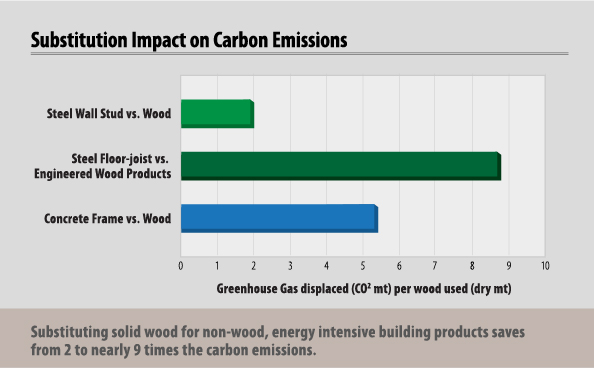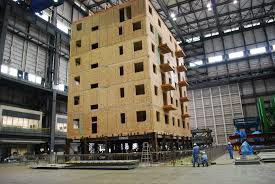Wood from working forests is the most responsible building material on earth. Natural, renewable, and climate friendly, wood is a vital part of the green economy of the 21st Century. From home building to innovative uses in modern architecture, to the thousands of products we use every day, wood is a sustainable, green material that is truly our most natural resource.
WASHINGTON FOREST PROTECTION ASSOCIATION
Sustainable Building Materials
Michael Green Videos
Michael Green
Trees, Wood, & Climate Change
Sustainable Forestry
Certification & Leed
Healthy Forests
Sustainable Design
Building with Wood
Engineered Wood
Building Codes
Our Mission

The Innovative Wood Products Collaborative believes wood from sustainably managed forests will address climate change and reshape the way we build cities in the future.
Wood provides a strong, safe, affordable building product that is more sustainable, less energy intensive, and friendlier to the environment than those currently used in most buildings.
The Innovative Wood Products Collaborative is a group of individuals, architects, engineers, ENGOs, academics, research-design-builders, forest landowners, manufacturers, technology companies and end users that support the use of wood from sustainably managed forests in tall buildings and other commercial structures. Natural, renewable, and climate friendly, wood is a vital part of the green economy of the 21st Century. From home building to innovative uses in modern architecture, to the thousands of products we use every day, wood is a sustainable, green building material that is truly our most natural resource. The Pacific Northwest is one of the most significant timber baskets in the nation, and a national center of expertise for sustainable forest management and innovative wood products manufacturing. Our goal is to grow the market for traditional and innovative wood products made in the Pacific Northwest for use in residential and commercial structures.
CORE PRINCIPLES
The Pacific Northwest is a national center of expertise for sustainable forest management
We seek to:
- Promote the benefits of wood as a cost-effective and environmentally preferred green building material to the design/build communities;
- Develop professional and science-based print and electronic materials that highlight wood products as a preferred green building material;
- Underscore the Pacific Northwest’s sustainable forest practices and high environmental standards throughout all communications; and
- Advocate for the Pacific Northwest as a national center of expertise for sustainable forest management and innovative wood products manufacturing.
COLLABORATORS
partners with a shared vision
Green Building

Wood is the ONLY major construction material that is renewable.
WOOD STORES CARBON: USING WOOD REDUCES FOSSIL FUEL EMISSIONS
20-30% of global CO2 emissions could be avoided

Trees naturally create wood using solar energy, and relatively little additional energy is needed to manufacture wood products. A Yale University-led study reveals that buildings and bridges constructed with wood, versus steel and concrete, would substantially reduce global carbon dioxide emissions and fossil fuel consumption. building
The manufacture of steel, concrete, and brick accounts for about 16 percent of global fossil fuel energy consumption. When the transportation and assembly in buildings of these materials are factored in, the share of fossil fuel energy used climbs to 20% to 30%.
Wood products naturally store carbon (50% of the dry weight of wood is carbon, unreleased into the atmosphere). Studies show that 14% to 31% of global CO2 emissions could be avoided by substituting wood for steel and concrete bridges and buildings.
Wood products require far less energy to manufacture than concrete and steel. The sustainable harvesting and manufacturing of wood products not only requires less fossil fuel than production of other building materials, as the forest regrows, carbon is sequestered more rapidly when the forest is young.
LIFE CYCLE ANALYSIS: HOW SCIENCE MEASURES GREEN
Mitigate global climate change

Using natural wood products instead of fossil fuel-intensive building products sharply reduces carbon emissions. Sustainable forestry can play a major role in carbon sequestration and help to mitigate global climate change.
The Consortium for Research on Renewable Industrial Materials (CORRIM) is a study group made up of fifteen research institutions. Over the last decade, CORRIM has measured the carbon input and output of forests and other building materials at every stage of their life cycle through a process called Life Cycle Analysis (LCA) and determined that forests are an integral part of the green economy. The full report containing a complete summary of CORRIM’s recommendations is available here.
Through Life Cycle Analysis (LCA), scientists analyze the total environmental impact of products based on all steps, beginning with gathering raw materials to create products, and ending when all materials are discarded and returned to the earth. All raw material inputs and product outputs are measured at every stage in the product life cycle, with the perspective that all stages are interdependent. Careful analysis then considers the environmental impacts of each of these inputs and outputs to identify the net environmental impact of a particular material or product.
SUBSTITUTE WOOD FOR ENERGY-INTENSIVE BUILDING PRODUCTS
Wood has the lowest carbon impact among building materials.

Wood used in long-lived products provides the greatest reduction in fossil fuel use and emissions. On average, when we substitute wood for energy-intensive building products, we offset two tons of carbon emissions for every dry metric ton of wood used. This occurs because we are eliminating fossil fuel emissions that would have been released into the air had we used more energy-intensive materials, thus adding to the net benefit of wood. Coupling this with the fact that the net carbon stored in wood products is far greater than alternative materials, it becomes clear wood has the lowest carbon impact among building materials. Builders, therefore, have a great opportunity to mitigate carbon emissions by choosing wood products over steel, concrete and plastics.
Additional findings from CORRIM underscore the importance of sustainable forest management in mitigating carbon emissions. As trees reach maturity and growth slows, the amount of carbon removed from the atmosphere diminishes. However, the rate of removal of atmospheric carbon can be sustained by harvesting trees before their growth slows and thereby moving the carbon into wood products for permanent storage. Shorter harvest intervals can increase the total amount of carbon sequestered by increasing the carbon stored in wood product pools and displacing carbon emissions by substituting wood products for other building materials sooner.
THE CARBON CYCLE: HOW FORESTS AND WOOD LOCK AWAY CARBON
Healthy, growing trees remove carbon dioxide from the atmosphere.

Carbon dioxide is one of the main greenhouse gases contributing to global warming. Sustainably managed forests play a vital role in reducing the amount of atmospheric carbon dioxide. That’s why it is so important to understand the role of forests in the carbon cycle and mitigation of climate change.
Healthy, growing trees remove carbon dioxide from the atmosphere, store carbon in tree biomass and release oxygen back into the air through the photosynthesis process. The natural removal of carbon from the atmosphere is a part of the carbon cycle known as carbon sequestration. Trees accumulate and sequester carbon as they grow and when harvested, continue to store carbon in lumber, wood and paper products.
Because wood products are easily recycled, carbon storage is extended beyond the life of the original product. In fact, about one-half of the weight of dry wood is stored carbon. Wood is also energy efficient for building because it requires only small amounts of energy to harvest and process. Using wood as a substitute for more energy-intensive building materials provides the greatest reduction in fossil fuel use and emissions.
Sustainable Forestry

This is the most environmentally sustainable place on earth to grow wood.
Wood building materials are products of solar energy, a renewable resource, and wood itself is renewable, reusable and recyclable. As well, wood products that come from sustainably managed forests play a vital role in protecting the Earth’s climate.

Trees remove CO2 from the atmosphere by storing carbon in leaves, branches, and primarily in the trunk as wood. Young, healthy, vigorously growing trees sequester carbon at a higher rate than older trees, which absorb less carbon as they mature. Healthy forests–both young and old–provide significant environmental benefits. In fact, Pacific Coast forests provide 39% of all carbon storage in the U.S., the highest average carbon storage per acre in the United States.[1] About 70% of the carbon in every log brought to a sawmill is sequestered in wood products.
Oregon and Washington’s forests and harvested wood products absorb and store 25% of the region’s total emissions.[2]
Modern, scientific forestry is sustainable and renewable. Trees are harvested then replanted. Nearly 100 million trees are replanted each year in Washington and Oregon managed forests. This cycle of harvesting and replanting stores carbon–not only in living trees in the forest, but in finished wood products such as lumber and furniture. Substituting wood for non-renewable resources such as concrete and steel can be a major factor in reducing greenhouse gasses in the atmosphere.

WASHINGTON FORESTLAND OWNERSHIP
Forests continue to flourish as they have for centuries.
In Washington about two-thirds of the forestland is managed by state, federal and tribal interests, and one-third is managed by private family and company landowners. This diversity of ownership allows our forests to fulfill many economic, social, and environmental needs. Private forests provide about 75% of the wood harvested each year. Oregon and Washington combined produce 30% of the nation’s softwood lumber.
In our state and national parks, wilderness areas and wildlife refuges, forests continue to flourish as they have for centuries. In our working forests, trees are grown, harvested and replanted in a continuous cycle, sustainably providing the forest and paper products we use every day. Drag your mouse over the pie chart for details.
WORKING FORESTS: COMMITTED TO LONG-TERM SUSTAINABILITY
100+ million trees are replanted each year in Oregon and Washington's forests.
Over the past two decades, it has been primarily private forests in Oregon and Washington that have supplied the region and the nation with sustainably grown wood products. We call these “working forests.” Private forest landowners’ primary objective for these lands is to provide a long-term source of timber and wood fiber, even while they protect natural resource values such as clean water and air, fish and wildlife habitat, recreation and scenic beauty. In a sustainably managed forest, harvested trees are replanted.
In the United States, forest practices are regulated at the state level. Oregon and Washington were among the first states to adopt comprehensive forest practices laws in the 1970s, and these laws have been updated continuously as new practices and sound science have pointed the way. Both states have tough laws. These laws limit harvest size and require replanting after harvest. They require loggers to leave forested buffers on each side of fish-bearing streams to keep waters cool and clean. They also must leave standing trees or snags and down logs throughout a harvested area for wildlife habitat. Strict state and federal laws govern the use of forest herbicides to remove invasive weeks and vegetation that competes with young trees. Roads must be engineered to avoid runoff of sediment into streams. Landslide-prone areas are off limits to harvest.

Sustainability means that we meet the needs of the present generation without sacrificing the ability of future generations to meet their own needs. In forestry, where a landowner might not see a mature “crop” for 40, 50 years or more, it takes patience, a tolerance for risk and a long-term commitment. Fire, insects and disease are a constant threat, as are unwelcome visitors who dump illegal trash or engage in illegal behavior.
Those who work in the forest sector — from foresters to scientists to loggers to wood products manufacturers — have a deep and profound respect for the forest and all it provides. They understand that for there to be healthy, resilient forests in the future, we must adhere to the highest standard of stewardship in the present.
WOODY BIOMASS & GREEN ENERGY
Woody biomass the #2 source of renewable energy in the country
The 21st century world economy is searching for alternatives to fossil fuels for both environmental purposes and energy independence. Forests help provide a solution through the conversion of woody biomass to green energy. Woody biomass (wood chips, sawdust, bark, shavings, and tree trimmings) is a renewable source of energy harvested from sustainably managed forests
Bioenergy could emerge as a new and valuable world market for wood. (See the National Climate Assessment report on the potential of bioenergy.) As a secondary benefit, thinning the forest for bioenergy could aid in the restoration of forests threatened by drought, insects, and fire.
According to the US Department of Energy’s National Renewable Energy Laboratory (NREL), the majority of biomass energy is produced from wood and wood wastes.[3]
Today, woody biomass is the #2 source of renewable energy in the country, second only to hydropower as a renewable energy solution, and ranking ahead of wind and solar energy.[4]
THE FOREST HEALTH CRISIS
By actively managing unhealthy forests, we can restore forest health and fire resiliency

Unnaturally overcrowded and unhealthy forests often suffer from insect and disease outbreaks, making them more susceptible to catastrophic, destructive crown fires. (A crown fire is an uncontrollable blaze that leaps from treetop to treetop). Every 21,000 acres that burn produce emissions that are equal to a million cars on the road, for a year. These unnatural fires burn at such high temperatures that it often turns rich soil into clay and devastates the forest ecosystem.
AVOIDING CATASTROPHIC WILDFIRE
We must restore more acres, more rapidly if we are to prevent catastrophic fires
Twenty-six percent of the annual wood growth in Washington and 30% in Oregon is lost each year due to mortality, or trees dying because of insects, diseases and fire. These unhealthy forest conditions result from untended, unmanaged forests.[5] Active forest management can minimize the damage of wildfires, and return the land to a more historic forest condition. When natural fire cycles occur, these fires (and their emissions) are minor compared to the catastrophic fire of a neglected forest, fueled by the kindling of dead trees and untended forest undergrowth. Experts agree that forest health is a pressing issue and if unresolved will pose a serious economic and environmental threat. In 1999, the Government Accounting Office recommended that a strategy was needed to remove surplus fuel loads on federal forests. It’s important to note that two-thirds of the U.S. forest health problem is on federal forests.[6]

[1] USDA Forest Service GTR WO-59: Carbon Storage and Accumulation in United States Forest Ecosystems http://www.nrs.fs.fed.us/pubs/gtr/gtr_wo059.pdf pgs. 4-6
[2] Washington Department of Ecology. 2007. Greenhouse Gas Inventory & Reference Case Projections, 1990-2020. Center for Climate Strategies, pgs. ES-5 and I-3.
[3] Temperate Forest Foundation. Biomass for Energy & Forest Fuel Reduction. Eco-Link, 13:3.
[4] Aguilar, F. Wood energy in developed economies: An overlooked renewable. Resources for the Future, pg. 20.
[5] USDA Forest Resources of the United States, 2012 GTR WO-91, Table 36, Oct. 2014 A Technical Document Supporting the Forest Service 2015 Update of the RPA Assessment.
[6] Rummer, B. et. Al. 2003.A Strategic Assessment of Forest Biomass and Fuel Reduction Treatments in Western States. USDA Forest Service, Research and Development and the Western Forestry Leadership Coalition.
Why Build with Wood

Timber can help solve our global problems. As timber grows it soaks up carbon dioxide through photosynthesis. This is surely what we have been looking for.
Half the world’s seven billion people are in urban areas today, and futurists predict that by 2050, 75% of the people on earth will live and work in cities. The challenge is to find quality, affordable, and environmentally friendly housing for these billions of city dwellers. The answer may well be found in new architectural and engineering technologies that favor wood as the primary building material.
There are many sound reasons to turn to wood as the preferred building material of the 21st Century.

Wood is a renewable and sustainable resource that costs less to produce than steel and concrete, which have been the primary building materials of the last 125 years.

Wood is environmentally responsible because it stores carbon, whereas the production of man-made materials requires huge amounts of fossil fuels and harmful emissions.

Pound-for-pound, wood is as strong as steel and extremely durable.

And as you’ll discover below, exciting new technologies are enabling the construction of tall, modern wood buildings that are safer and cheaper to build.
REDUCE EMISSIONS
The building sector consumes 1/2 of the energy produced and is responsible for 1/2of the CO2 emissions in the U.S.
It’s surprising but true. The transportation industry is responsible for 28% of the country’s energy consumption, but the nation’s construction and building industry accounts for 48% of all the energy produced, as well as 45% of the greenhouse gases that are emitted into the atmosphere.
Much of this results from the fossil fuel energy required to forge steel and produce concrete. (Manufacturing a ton of concrete releases a ton of carbon dioxide into the atmosphere.) Wood building materials on the other hand, are relatively inexpensive to grow, manufacture and replenish because wood is natural, renewable and sustainably harvested from the nation’s working forests. Moreover, contrary to most manufacturing processes, forests produce oxygen, trees sequester carbon dioxide from the environment and store carbon in harvested wood products.
Buildings Consume Nearly Half of all the Energy Produced in the United States

The building sector consumes nearly half of all the energy produced in the United States — 48%, almost as much energy consumed by both the transportation and industry sectors combined.[1] The Energy Information Administration estimates that the building sector’s energy consumption will grow faster than that of transportation and industry.
To create a U.S. Building Sector, the residential buildings (operations) sector, commercial buildings (operations) sector, and industrial buildings (operations and materials embodied energy estimates) were combined.[2]
Buildings are Responsible for Nearly Half of all US CO2 Emissions
Policymakers have focused on transportation emissions as a major source of greenhouse gasses, and rightly so. But surprisingly, the building sector was responsible for nearly half — 45% of U.S. CO2 emissions in 2010. By comparison, transportation accounted for 34% of CO2 emissions and industry 21%. Wood is an effective way to slow this trend by reducing the embodied energy in building materials. Grown by the sun and nature, wood has a lower carbon footprint than other building materials such as concrete and steel.
The emergence of technologically advanced, engineered wood provides a strong, safe, affordable building product that is more sustainable, less energy intensive, and friendlier to the environment than those currently used in most buildings.

ADVANCES IN WOOD TECHNOLOGY–HEAVY TIMBER OR MASS TIMBER CONSTRUCTION
Innovation in wood technology makes tall wood buildings possible

Timber is an attractive material for green building construction as it has a lower carbon footprint, uses less energy and water and is 100% renewable from sustainably managed forests. This sets timber apart from other building materials, such as concrete and steel. While all materials are important to the construction of buildings, innovation and advances in wood technology are making it possible to build tall wood buildings using solid Mass Timber Construction.
Engineered wood products, such as Cross Laminated Timber (CLT), Glued Laminated Timber (Glulam), and Structural Composite Lumber (SCL) such as Laminated Veneer Lumber (LVL), Laminated Strand Lumber (LSL) and Parallel Strand Lumber (PSL) provides consistent quality and strength, changing the way buildings perform structurally, in earthquakes, and providing a predictable level of fire resistance. Because the size of CLT panels can be up to 19½ inches thick, 18 feet wide, and 98 feet long in North America, they are used for structural systems such as walls, floors and roofs. CLT is lightweight yet very strong, and because it is prefabricated, makes it fast and easy to install, generating almost no waste. It also provides good thermal insulation, good sound insulation and good performance under fire. Wood products tend to have lower environmental impacts than concrete or steel when considering the full life cycle impacts of these building products.
THE BUILDING COMMUNITY IS RE-THINKING WOOD
New advances in engineered wood are allowing the construction of tall, safe, and more economical wood buildings. Pioneering architects the world over are finding new ways to design and construct cost-efficient residences and commercial and high rises with wood as the core material.
Building with advanced wood products is more fire-safe. Tall wood buildings are constructed in a way that doesn’t connect floors and walls, so fire does not travel rapidly. Most important, the size and strength of mass timber panels (CLT, LVL, LSL) char and burn in a fire, but don’t buckle even in intense heat.
Engineered wood is more earthquake stable. Wood’s flexibility allows modern wood buildings to sway in an earthquake rather than shatter—with less resultant damage. The world’s largest earthquake shake table in Kobe, Japan tested a seven-story wood-framed condominium tower in a 7.5 magnitude earthquake and it escaped with barely a scratch. Proportional to the structure’s weight, wood is substantially lighter than steel or concrete and meets or exceeds the most demanding earthquake design requirements.

IT’S TIME TO RE-EVALUATE BUILDING CODES
Mass timber panels maintain its strength during a fire unlike other building materials
Building ordinances, particularly in the U.S. are lagging behind the technology of modern wood construction. Outmoded concerns about fire safety and the stability of tall buildings limit many wood buildings to four stories.

But engineered wood has changed the game dramatically. Many nations in Europe and Asia have embraced the promise of tall, green buildings designed and constructed by visionary architects using state-of-the-art wood products. Mass timber panels, such as Cross Laminated Timber maintains its strength during a fire, unlike other building materials. Like heavy timber, they char at a rate that is slow and predictable, maintaining their strength and giving occupants more time to leave the building. While fire performance may appear to be a hurdle, research indicates that the panels develop a protective char layer and maintain their structural integrity if properly designed.
The time has come for “building code evolution” for our modern cities and for the health of the planet.
THE NATURAL, HUMAN WAY TO BUILD
Wood is the natural, human way, to build
There’s one more important aspect to wood construction. Along with all the environmental and economic benefits of wood, there is a very human advantage. Unlike concrete and steel, wood is a natural, living material. It springs from the earth and it is eternally replenishable. It was mankind’s first building material and we feel an emotional and physical connection to its aesthetics and strength. From its beautiful grain and texture, to its non-polluting, carbon-storing benefits, something in our soul tells us that wood is good. The Ballard Library is a great example of celebrating wood construction, exemplifying the Pacific Northwest’s love for the natural environment.











